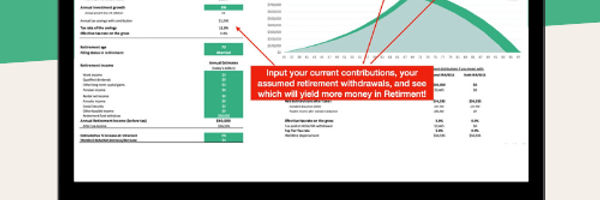The sheer number of offerings can be intimidating to anyone thinking about investing in a retirement plan for the first time. It's easy to get confused, especially when it comes to tax-advantaged plans versus employer plans.

Roth IRA or 401k? This template will answer your questions.
With this template, you will get:
All DFY, simply add your details
Charts for comparison and clear answer
Easily update for any year (2023, 2024, 2025, etc…)

Retirement Planning Guide
We've developed this retirement planning guide to help users figure out what might be the best option in their particular situation. Using a series of questions that appear below, we'll try to help determine what types of retirement plans to consider when faced with multiple options. We'll also try to help users decide which fund is likely to yield the highest return.
Additional Resources |
The way this retirement guide works is very straightforward. We're going to ask a series of questions, and depending on the answer, we make an investment suggestion. Remember, the goal here is to save money for retirement, so it's important to take advantage of 401(k) plans, 403(b) plans, Roth IRAs and Traditional IRAs whenever possible. This guide should help users to make an informed decision when faced with all of these options.
When thinking about the answers to some of these questions, users should think about factors such as their tax rate in retirement, whether or not they're eligible to make IRA contributions, and how easy it is to contribute to certain plans; especially payroll deduction plans offered through an employer.
Retirement Planning Questions
Question 1: Does your current employer sponsor a retirement plan such as a 401(k) or 403(b) plan?
No: Go to Question 4
Yes: Go to Question 2
Question 2: Does your employer match your contributions to a retirement plan such as a 401(k) or 403(b) plan?
No: Go to Question 4
Yes: Go to Question 3
Question 3: Are you contributing enough money to your employer plan to obtain the maximum match for which you're eligible?
No: Employer matching is hard to beat when it comes to retirement investment options. An employer match is like an instant return on investment, and you should consider funding your employer plan up to the maximum employer matching contribution before funding any other type of retirement plan.
Yes: Go to Question 4
Question 4: Are you currently contributing to a Roth IRA or Traditional IRA retirement account?
No: Consider funding a Roth IRA or Traditional IRA account, up to the maximum of $7,000 if you're 50 or older in 2020 or 2021. Roth IRAs allow you to contribute after-tax dollars in exchange for tax-free income at retirement. Traditional IRAs offer you the chance to obtain a tax deduction today, in exchange for taxable income at retirement.
Yes: Go to Question 5
Question 5: Are you making the maximum contribution to a Roth IRA account or a Traditional IRA?
No: Consider maximizing your contribution to a Roth IRA or Traditional IRA. In 2020 and 2021, the maximum contribution to an IRA is $6,000, and if you're 50 and over then you can contribute up to $7,000. In 2022, the limit moves up based on an index of inflation. Roth IRAs allow you to contribute after tax dollars in exchange for tax-free income at retirement. Traditional IRAs offer you the chance to obtain a tax deduction today in exchange for taxable income at retirement.
Yes: Go to Question 6
Question 6: Do you have a spouse that currently earns little, if any income?
No: Go to Question 7
Yes: Consider investing in a Spousal IRA with either after tax money (Roth IRA) or using a tax deductible retirement account (Traditional IRA). See the contribution limits that apply, which were already mentioned in Question 5.
Question 7: Are you looking for other tax deferred retirement options to fund your retirement years?
No: Stop
Yes: One final option you may want to consider as part of your retirement plan is funding a non-deductible Traditional IRA.

Roth IRA or 401k? This template will answer your questions.
With this template, you will get:
All DFY, simply add your details
Charts for comparison and clear answer
Easily update for any year (2023, 2024, 2025, etc…)

Funding Retirement Plans
This guide should help users to understand how to progress down the path of retirement planning. The single most important factor to remember is this simple rule. Investing for retirement is just as important as any other investment someone might make, whether it's in a college degree or a new home. Don't shortchange the future by ignoring the retirement options today.
Retirement Calculators
While the above retirement planning guide can help users to figure out which type of retirement account they might want to start funding, it really doesn't help answer the question: How much money should I be saving for retirement?
To help answer that question, we've put together a series of retirement calculators. We have tools ranging from 401(k) savings calculators to Roth versus Traditional IRA decisions, and even a calculator that can help users to figure out how much retirement income they'll need.
About the Author - Investing in Retirement Plans



.jpg)
.jpg)